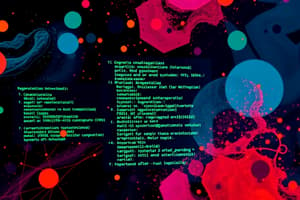Podcast
Questions and Answers
What is one key function provided by operating systems for user interaction?
What is one key function provided by operating systems for user interaction?
- File storage management
- Task scheduling
- User interface (correct)
- Network configuration
Which user interface is characterized by the use of text commands typed specifically?
Which user interface is characterized by the use of text commands typed specifically?
- Touch-screen Interface
- Graphics User Interface (GUI)
- Voice User Interface (VUI)
- Command-Line Interface (CLI) (correct)
What must an operating system do to execute a program after it is loaded into memory?
What must an operating system do to execute a program after it is loaded into memory?
- Compile the program
- Delete any previous versions
- Run the program (correct)
- Automatically optimize the code
What type of interface would NOT be typically found in modern operating systems?
What type of interface would NOT be typically found in modern operating systems?
Which of the following is NOT a service provided by operating systems?
Which of the following is NOT a service provided by operating systems?
What might require I/O operations in a running program?
What might require I/O operations in a running program?
In terms of user interfaces, which option represents a common feature across multiple operating systems?
In terms of user interfaces, which option represents a common feature across multiple operating systems?
Which of the following options reflects a typical user interface provided by mobile operating systems?
Which of the following options reflects a typical user interface provided by mobile operating systems?
What is a primary function of the operating system regarding I/O devices?
What is a primary function of the operating system regarding I/O devices?
Which of the following actions is NOT associated with file-system manipulation?
Which of the following actions is NOT associated with file-system manipulation?
How may processes exchange information in an operating system?
How may processes exchange information in an operating system?
What type of error might the operating system need to handle?
What type of error might the operating system need to handle?
If the operating system encounters a memory error, what action might it take?
If the operating system encounters a memory error, what action might it take?
What is NOT a function of the operating system's error detection capabilities?
What is NOT a function of the operating system's error detection capabilities?
Which statement about permission management in file systems is true?
Which statement about permission management in file systems is true?
Which communication method involves processes writing to a shared memory area?
Which communication method involves processes writing to a shared memory area?
What is the primary advantage of command-line interfaces in terms of repetitive tasks?
What is the primary advantage of command-line interfaces in terms of repetitive tasks?
What provides a programming interface to the services offered by an operating system?
What provides a programming interface to the services offered by an operating system?
Which programming languages are typically used for writing system calls?
Which programming languages are typically used for writing system calls?
What does an Application Programming Interface (API) specify?
What does an Application Programming Interface (API) specify?
Which of the following is NOT a common API mentioned?
Which of the following is NOT a common API mentioned?
What is a typical way for programmers to access an API?
What is a typical way for programmers to access an API?
Why might a simple program use a large number of system calls?
Why might a simple program use a large number of system calls?
What function does an API typically serve in programming?
What function does an API typically serve in programming?
What is one of the primary functions of resource allocation in an operating system?
What is one of the primary functions of resource allocation in an operating system?
How does logging function within an operating system?
How does logging function within an operating system?
What does protection in an operating system ensure?
What does protection in an operating system ensure?
Why is security important in a multiuser or networked computer system?
Why is security important in a multiuser or networked computer system?
What role do usage statistics play for system administrators?
What role do usage statistics play for system administrators?
One of the objectives of an operating system's resource management is to:
One of the objectives of an operating system's resource management is to:
Which of the following best describes the function of debugging facilities?
Which of the following best describes the function of debugging facilities?
What is one consequence of ineffective resource allocation in an operating system?
What is one consequence of ineffective resource allocation in an operating system?
What is required when a program attempts to open an input file?
What is required when a program attempts to open an input file?
When an output file already exists, which option is NOT available to the program?
When an output file already exists, which option is NOT available to the program?
What happens during the reading process from an input file?
What happens during the reading process from an input file?
What must a program do before it writes to an output file?
What must a program do before it writes to an output file?
What can cause the program to terminate abnormally?
What can cause the program to terminate abnormally?
What sequence of actions occurs when both files are properly set up?
What sequence of actions occurs when both files are properly set up?
If the input file does not exist, what is one potential outcome?
If the input file does not exist, what is one potential outcome?
Which statement correctly describes the handling of existing output files?
Which statement correctly describes the handling of existing output files?
Flashcards are hidden until you start studying
Study Notes
### Operating System Services
- Operating systems provide environments for program execution, and services for users and programs.
- User Interface Different Operating Systems provide different user interfaces:
- Command-Line Interface (CLI) : Keyboard input for commands
- Graphics User Interface (GUI): Most commonly used interface
- Touchscreen Interface: Used by mobile devices
- Combination of all the above interfaces: Some OS provide multiple UI variations.
- Program execution:
- Operating systems can load programs into memory and then execute them.
- Processes can be ended by the Operating System normally as well as in the case of errors or abnormal conditions.
- I/O operations:
- Programs can access I/O devices via Operating System services.
- For efficiency and protection, users are prevented from using devices directly.
- File System Manipulation: The file system provides services to:
- Read and write files and directories
- Create and delete files and directories with the help of file names
- Search files based on a given name
- List file information
- Manage file permissions based on file ownership
- Communications: Processes can exchange information with each other.
- Processes on the same or different machines can communicate with each other via a network.
- The Operating System facilitates communication through shared memory, where two or more processes can read and write to a shared section of memory.
- Processes can also use message passing where information packets are exchanged.
- Error detection: The operating system constantly monitors for errors and attempts to correct them.
- The operating system tracks memory errors, power failures, I/O device errors and user program errors.
- The operating system responds to these errors by either attempting to correct them, terminating a process, or returning an error code to the process.
- Debugging facilities assist users and programmers in using the system efficiently.
- The Operating System also provides functions for efficient system operation and resource sharing between processes:
- Resource Allocation: When multiple processes are running concurrently, resources (e.g., CPU cycles, memory, file storage, I/O devices) need to be allocated to each process.
- Logging: The operating system keeps track of user activity and resource usage for accounting and system configuration purposes.
- Protection and Security: To protect information and the system itself, the operating system controls access to resources and security measures.
- Protection ensures controlled access to system resources.
- Security measures are taken to defend the system from external threats and unauthorized I/O device access.
User and Operating System Interface
- Command-Line Interface (CLI): The user interacts with the system by typing text commands in a specific format. The operating system responds to the commands.
- Graphics User Interface (GUI): Users interact with the system using graphical elements like windows, icons, and menus.
- Graphical User Interfaces (GUIs):
- GUI use a mouse or a keyboard to interact with the system.
- They are more user-friendly and intuitive for the average user.
- They simplify system operations.
- GUIs are easier to use than command-line interfaces for many users.
- Command-Line Interface (CLI):
- CLI provide an efficient way to access system resources, and are commonly used by developers for their programmability.
- They are more difficult to use for the average user.
- CLIs make repetitive tasks easier because of their own programmability.
- They can automate common tasks by storing command sequences in files.
System Calls
- System calls provide the programming interface to the OS services.
- They are generally written in high-level languages like C or C+.
- Low-level tasks that require hardware access may be written in assembly language.
- The OS uses system calls to manage its resources and operations.
- Programs frequently execute thousands of system calls every second.
- Instead of directly using system calls, programs usually make calls through a high-level Application Programming Interface (API).
- Each Operating System names its system calls differently.
Application Programming Interface (API)
- Applications are built according to an API, which specifies the functions and data structures that an application can use.
- The API provides the programmer with a set of functions, their parameters and expected return values.
- Some popular APIs: Win32 API for Windows, POSIX API for POSIX-based systems (like UNIX, Linux, and Mac OS X), and Java API for the Java virtual machine (JVM). The operating system provides a library of functions that implement the API.
- Applications access the API by calling functions in the library. Windows provides the API as a set of C functions, while UNIX and Linux use
libcfor C programs. - While the API functions are invoked by applications, these functions usually call the system calls as well.
Studying That Suits You
Use AI to generate personalized quizzes and flashcards to suit your learning preferences.



